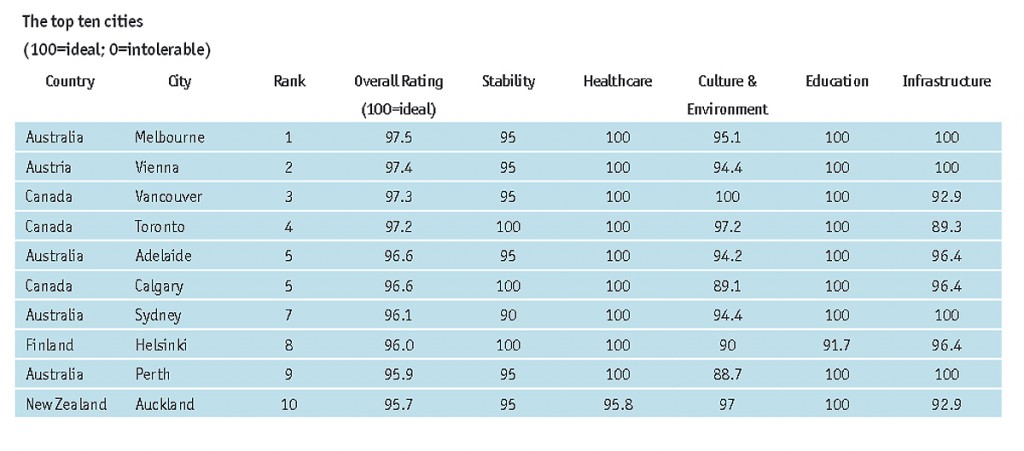Melbourne retained its place as the most liveable location of the 140 cities surveyed, by the Economist Intelligence Unit in its latest research report.
In its report titled A Summary of the Liveability Ranking and Overview the Austrian capital, Vienna, was ranked second. Vancouver, which was the most liveable city surveyed until 2011, lies in third place.
Over the past six months only nine cities of 140 surveyed have experienced changes in scores and only 20 cities (14 percent of those surveyed) have seen changes over the past year. Over half of the changes taking place over the past 12 months have been driven by deteriorating scores, with instability re-emerging as a key factor in influencing global scores. Events in Ukraine, in particular, have had significant knock-on effects for cities such as Kiev, Moscow and St Petersburg.
Localised instability has also affected locations like Bangkok.
At a global level, average instability continues to see marginal declines, with sharp falls in specific hotspots weighing on a more static global backdrop. The average global liveability score has fallen by 0.16 and 0.22 percentage points over the last six and twelve months respectively, to 75.33.
When a five-year view is taken, global liveability has declined by 0.68 percentage points, highlighting the fact that the last five years have been characterised by heightened unrest in the wake of the global economic crisis, which has undermined many of the developmental gains that cities may have experienced through public policy and investment.
Over five years 82 of the 140 cities surveyed have seen some change in overall liveability scores. Of these cities, 51 have seen declines in liveability. Three cities in particular, Kiev, Tripoli and Damascus, have seen significant declines of 17.8, 18.1 and 28.3 respectively, illustrating that conflict is, unsurprisingly, the key factor in undermining wider liveability.
For the very top tier of cities, with scores of over 80 percent, there is no change to report over the past 12 months. Many cities have seen levels of unrest stabilise as economies recover from the global and euro-zone crises but austerity and tighter fiscal budgets may also have slowed planned improvements, meaning that scores have remained static. With such high scores already in place and with the slow nature of change for improvement, the overall impact on the top tier of cities is marginal and is likely to remain so, barring a significantly disruptive event.
Andrew Batt, International Group Editor of PropertyGuru Group, wrote this story. To contact him about this or other stories email andrew@propertyguru.com.sg
Most-read stories from last week on DDproperty.com’s English news
Shortlist revealed for Thailand Property Awards 2014
Bangkok landlords raise retail rents by 3.5%
Strong growth in office deals
If you have a news story or comment for publication about Thailand property or real estate email: andrew@propertyguru.com.sg





